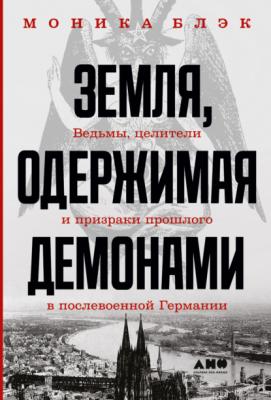Земля, одержимая демонами. Ведьмы, целители и призраки прошлого в послевоенной Германии. Моника Блэк
Читать онлайн.| Название | Земля, одержимая демонами. Ведьмы, целители и призраки прошлого в послевоенной Германии |
|---|---|
| Автор произведения | Моника Блэк |
| Жанр | Исторические приключения |
| Серия | |
| Издательство | Исторические приключения |
| Год выпуска | 2020 |
| isbn | 9785001395706 |
60
Bruno Grabinski, «Kriegsprophezeiungen», Neues Tageblatt, October 15, 1946, 3. Clipping in Hauptstaatsarchiv Hannover (далее HH), ZGS 2.1. Судя по всему, автором текстов пророчеств, рассылаемых Геббельсом по почте, являлся Антон Йоханссон, шведский подледный рыбак и проповедник, предсказания которого были опубликованы в Германии в 1953 г. в форме антисемитского и антикоммунистического трактата Merkwürdige Gesichte: Die Zukunft der Völker (Stockholm: Sverigefondens Förlag, 1953).
61
Alfred Dieck, «Der Weltuntergang am 17. März 1949 in Südhannover», Neues Archiv für Niedersachsen, Bd. 4 (1950): 704–20; здесь, 705.
62
Fred Ritzel, «'Was ist aus uns geworden? – Ein Häufchen Sand am Meer': Emotions of Post-war Germany as Extracted from Examples of Popular Music», Popular Music 17:3 (1998): 293–309; здесь: 294.
63
Архивы Institut für Volkskunde der Deutschen des östlichen Europa (ранее Johannes-Künzig-Institut für ostdeutsche Volkskunde), Sammlung Karasek, Neue Sagenbildung (далее JKI/SK/NS) 04/01–2.
64
JKI/SK/NS, 04/03–109.
65
JKI/SK/NS, 04/01–49.
66
JKI/SK/NS, 04/01–01.
67
Elisabeth Reinke, «Die Zerstörung der Stadt Friesoythe und das 'Zweite Gesicht'» Oldenburgische Volkszeitung, July 8, 1950. Вырезка в: HH, VVP 17, Nr. 3502.
68
Bessel, Germany 1945, 12.
69
Rüdiger Overmans, Deutsche militärische Verluste im Zweiten Weltkrieg (Munich: Oldenbourg, 1999), 319.
70
Bessel, Germany 1945, 11.
71
Richard Bessel, Nazism and War (New York: Modern Library, 2006), 179, citing Dietrich Eichholtz, Geschichte der deutschen Kriegswirtschaft 1939–1945, Band III: 1943–1945 (Berlin: Akademie-Vlg., 1996), 632–34.
72
Süss, Death from the Skies, 105, 451.
73
Все цитаты в этом абзаце: «Bericht aus Akten der Geschäftsführenden Reichsregierung Dönitz von Ende März 1945», in Heinz Boberach, ed., Meldungen aus dem Reich, 1938–1945, Band 17 (Herrsching: Manfred Pawlak, 1984), 6735, 6737.
74
Boberach, Meldungen, «Bericht», 6738, 6735.
75
От новолат.: «богооправдание». – Прим. пер.
76
Nossack, The End, 1–2.
77
Источником выражения «общество изгнанников» является кн.: Bessel, Germany 1945.
78
Keith Lowe, Savage Continent: Europe in the Aftermath of World War II (New York: St. Martin's Press, 2012), chapter 9.
79
J. Glenn Gray, The Warriors: Reflections of Men in Battle (New York: Harper& Row, 1959), 220.
80
Foreign Relations of the United States: Diplomatic Papers: The Conferences at Malta and Yalta 1945 (Washington: US Government Printing Office, 1955), 970–71.
81
John H. Herz, «The Fiasco of Denazification in Germany», Political Science Quarterly 63:4 (Dec. 1948): 570.
82
Alice Weinreb, Modern Hungers: Food and Power in Twentieth-Century Germany (New York: Oxford University Press, 2017), 96.
83
«Morally unclean»: Steven M. Schroeder, To Forget It All and Begin Anew: Reconciliation in Occupied Germany (Toronto: University of Toronto Press, 2013), 17.
84
Ulrike Weckel, Beschämende Bilder: Deutsche Reaktionen auf alliierte Dokumentarfilme über befreite Konzentrationslager (Stuttgart: Franz Steiner, 2012).
85
Parkinson, An Emotional State, 2.
86
Norbert Frei, Adenauer's Germany and the Nazi Past: The Politics of Amnesty and Integration, trans. Joel Golb (New York: Columbia University Press, 2002), xiii.
87
Jessica Reinisch, The Perils of Peace: The Public Health Crisis in Occupied Germany (Oxford, UK: Oxford University Press, 2013), 163.
88
Olick, Hangman, 124–25.
89
Herz, «Fiasco», 572.
90
Alexandra F. Levy, «Promoting Democracy and Denazification: American Policymaking and German Public Opinion», Diplomacy& Statecraft 26:4 (2015): 614–35.
